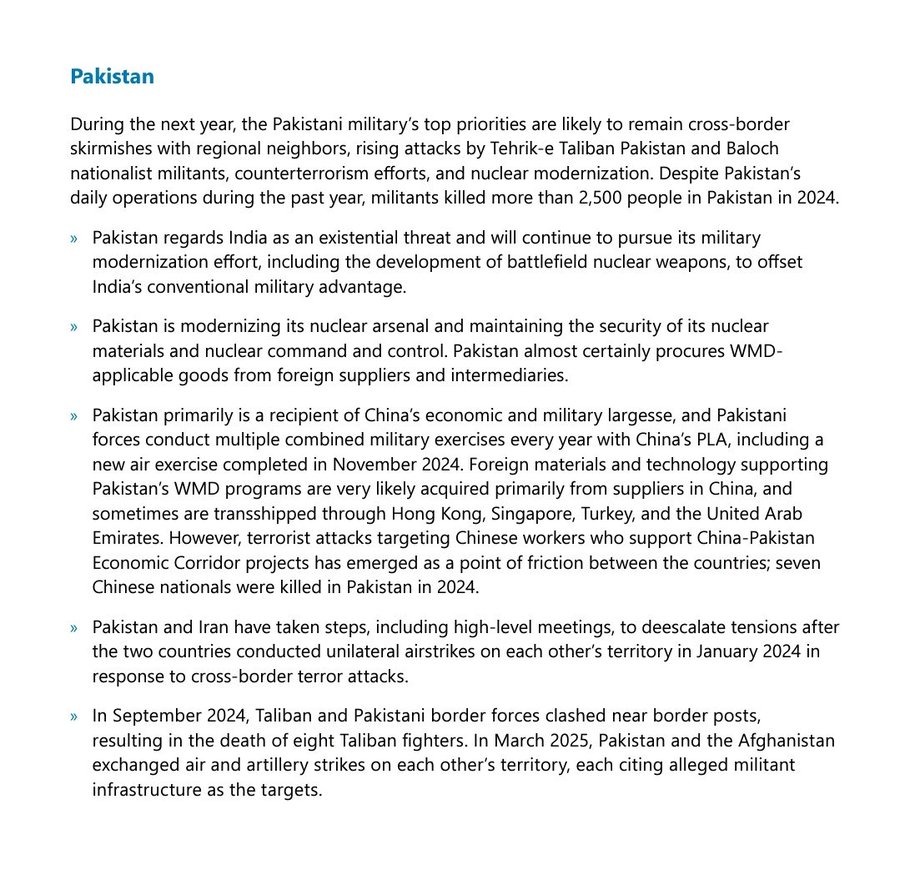A US intelligence report highlights Pakistan’s growing nuclear program, strong military ties with China, and ongoing regional tensions. The report also warns of broader security risks driven by AI, cyber tools, and advanced military tech.
A new US intelligence report says that Pakistan is upgrading its nuclear weapons and continues to see India as a major threat. The report highlights how Pakistan is focusing on cross-border tensions, nuclear modernization, and stronger ties with China.

According to the report, more than 2,500 people were killed by militants in Pakistan in 2024, despite the country’s ongoing security operations. Major concerns include attacks by Tehrik-e Taliban Pakistan, Baloch militants, and ongoing border skirmishes.

In this evolving landscape, Pakistan has emerged as a key area of focus, says the report. The US intelligence report further highlights that Pakistan continues to view India as an ‘existential threat’ and is expanding its military capabilities accordingly. This includes modernizing its nuclear arsenal and developing battlefield nuclear weapons to counter India’s superior conventional forces.
Despite internal counterterrorism operations, Pakistan saw over 2,500 deaths due to militant violence in 2024. The report notes ongoing threats from Tehrik-e Taliban Pakistan (TTP) and Baloch separatists, as well as frequent cross-border skirmishes with neighboring countries.
Pakistan's nuclear buildup
Pakistan's nuclear efforts are also a concern. The country is working to secure its nuclear materials and command systems while relying on foreign suppliers for sensitive technologies. Most of these supplies are likely sourced from China and routed through countries such as Hong Kong, Turkey, Singapore, and the UAE.
China-Pakistan bond
China plays a crucial role in Pakistan’s military and economic survival. The report says the two nations conduct multiple joint military drills each year. One such air exercise took place in November 2024. However, growing attacks on Chinese workers involved in the China-Pakistan Economic Corridor (CPEC) have caused friction between the allies. Seven Chinese nationals were killed in such attacks in 2024.
The report says that Pakistan’s regional tensions have been escalating. In January 2024, both Pakistan and Iran conducted unilateral airstrikes across each other’s borders, citing retaliation for terrorist attacks. While high-level diplomatic meetings followed, mistrust remains.
Meanwhile, in March 2025, Pakistan and Afghanistan exchanged artillery and air strikes, with both sides blaming each other for harboring militants. A similar clash occurred in September 2024 when Taliban and Pakistani border forces engaged near frontier posts, leaving eight Taliban fighters dead.
As global adversaries exploit emerging technologies and geopolitical openings, the report stresses that countries like Pakistan, already armed with nuclear capabilities and tied closely to powers like China, must be closely monitored. The US warns that the accelerating pace of innovation will only multiply such threats in the coming years.
The report further said that the United States is facing an increasingly complex global security environment, with rapid technological advancements transforming how threats emerge and spread. According to a new US intelligence assessment, developments in artificial intelligence (AI), biotechnology, space, cyber tools, and unmanned systems are reshaping modern conflict.
Adversaries are deepening cooperation, militarily, diplomatically, and economically, to bypass traditional US power structures. These trends are not only empowering hostile states but also enabling criminal networks and foreign intelligence operations to evade detection and target American interests in new ways.


